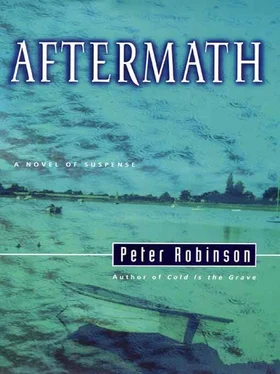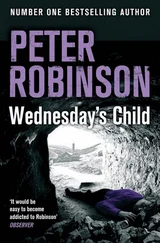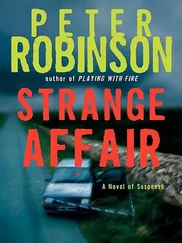“I suppose so.”
She put her hand on his arm. “I’m only teasing, Dad. I’ve got nothing to complain about.”
“You’ve got plenty, but it’s nice of you not to say so. Anyway, apart from Damon, how are you ?”
“I’m fine. Studying hard. Some people say second year’s harder than finals.”
“Any plans for the summer?”
“I might go to France again. Charlotte’s parents have a cottage in the Dordogne but they’re going to be in America and they said she can take a couple of friends down if she wants.”
“Lucky you.”
Tracy finished her Big Mac and sipped some Coke through her straw, looking closely at Banks. “You look tired, Dad,” she said.
“I suppose I am.”
“Your job?”
“Yes. It’s a lot of responsibility. Keeps me awake at night. I’m not at all certain I’m cut out for it.”
“I’m sure you’re just wonderful.”
“Such faith. But I don’t know. I’ve never run such a big investigation before, and I’m not sure I ever want to again.”
“But you’ve caught him,” Tracy said. “The Chameleon killer.”
“Looks that way.”
“Congratulations. I knew you would.”
“I didn’t do anything. The whole thing was a series of accidents.”
“Well… the result’s the same, isn’t it?”
“True.”
“Look, Dad, I know why you haven’t been in touch. You’ve been busy, yes, but it’s more than that, isn’t it?”
Banks pushed his half-eaten burger aside and worked on the chips. “What do you mean?”
“You know what I mean. You probably held yourself personally responsible for those girls’ abductions, the way you always do, didn’t you?”
“I wouldn’t say that.”
“I’ll bet you thought that if you relaxed your vigilance for just one single moment he’d get someone else, another young woman just like me , didn’t you?”
Banks applauded his daughter’s perception. And she did have blond hair. “Well, there may be a grain of truth in that,” he said. “Just a tiny grain.”
“Was it really horrible down there?”
“I don’t want to talk about it. Not at lunch. Not with you.”
“I suppose you think I’m being nosy for sensation like a newspaper reporter, but I worry about you. You’re not made of stone, you know. You let these things get to you.”
“For a daughter,” said Banks, “you do a pretty good impersonation of a nagging wife.” Immediately the words were out of his mouth he regretted them. It brought the specter of Sandra between them, again. Tracy, like Brian, had struggled not to take sides in the breakup, but whereas Brian had taken an immediate dislike to Sean, Sandra’s new companion, Tracy got along with him quite well and that hurt Banks, though he would never tell her.
“Have you talked to Mum lately?” Tracy asked, ignoring his criticism.
“You know I haven’t.”
Tracy sipped some more Coke, frowned like her mother and stared out of the window.
“Why?” Banks asked, sensing a change in the atmosphere. “Is there something I should know?”
“I was down there at Easter.”
“I know you were. Did she say something about me?” Banks knew he had been dragging his feet over the divorce. The whole thing had just seemed too hurried to him, and he wasn’t inclined to hurry, seeing no reason. So Sandra wanted to marry Sean, make it legal. Big deal. Let them wait.
“It’s not that,” Tracy said.
“What, then?”
“You really don’t know?”
“I’d say if I did.”
“Oh, shit.” Tracy bit her lip. “I wish I’d never got into this. Why do I have to be the one?”
“Because you started it. And don’t swear. Now, give.”
Tracy looked down at her empty chip carton and sighed. “All right. She told me not to say anything to you yet, but you’ll find out eventually. Remember, you asked for it.”
“Tracy!”
“Okay. Okay. Mum’s pregnant. That’s what it’s all about. She’s three months pregnant. She’s having Sean’s baby.”
Not long after Banks had left Lucy Payne’s room, Annie Cabbot strode down the corridors of the hospital to her appointment with Dr. Mogabe. She hadn’t been at all satisfied with PC Taylor’s statement and needed to check out the medical angle as far as it was possible to do so. Of course, Payne wasn’t dead, so there would be no postmortem, at least not yet. If he had done what it very much seemed that he had, then Annie thought it might not be such a bad idea to carry out a postmortem on him while he was still alive.
“Come in,” called Dr. Mogabe.
Annie went in. The office was small and functional, with a couple of bookcases full of medical texts, a filing cabinet whose top drawer wouldn’t shut, and the inevitable computer on the desk, a laptop. Various medical degrees and honors hung on the cream-painted walls, and a pewter-framed photograph stood on the desk facing the doctor. A family picture, Annie guessed. There was no skull beside it, though; nor was there a skeleton standing in the corner.
Dr. Mogabe was smaller than Annie had imagined, and his voice was higher in pitch. His skin was a shiny purple-black and his short curly hair gray. He also had small hands, but the fingers were long and tapered; a brain surgeon’s fingers, Annie thought, though she had nothing for comparison, and the thought of them poking their way through the gray matter made her stomach lurch. Pianist’s fingers, she decided. Much easier to live with. Or artist’s fingers, like her father’s.
He leaned forward and linked his hands on the desk. “I’m glad you’re here, Detective Inspector Cabbot,” he said, with a voice straight out of Oxford. “Indeed, if the police hadn’t seen fit to call, I would have felt obliged to bring them in myself. Mr. Payne was most brutally beaten.”
“Always willing to be of service,” said Annie. “What can you tell me about the patient? In layman’s terms, if you please.”
Dr. Mogabe inclined his head slightly. “Of course,” he said, as if he already knew the elite, technical mumbo jumbo of his profession would be wasted on an ignorant copper such as Annie. “Mr. Payne was admitted with serious head wounds, resulting in brain damage. He also had a broken ulna. So far, we have operated on him twice. Once to relieve a subdural hematoma. That’s-”
“I know what a hematoma is,” said Annie.
“Very well. The second to remove skull fragments from the brain. I could be more specific, if you wish?”
“Go ahead.”
Dr. Mogabe stood up and started walking back and forth behind his desk, hands clasped behind his back, as if he were delivering a lecture. When he came to name the various parts, he pointed to them on his own skull as he paced. “The human brain is essentially made up of the cerebrum, the cerebellum and the brain stem. The cerebrum is uppermost, divided into two hemispheres by a deep groove at the top, giving what you have probably heard called right brain and left brain. Do you follow?”
“I think so.”
“Prominent grooves also divide each hemisphere into lobes. The frontal lobe is the largest. There are also parietal, temporal and occipital lobes. The cerebellum is at the base of the skull, behind the brain stem.”
When Dr. Mogabe had finished, he sat down again, looking very pleased with himself.
“How many blows were there?” Annie asked.
“It’s difficult to be specific at this stage,” said Dr. Mogabe. “I was concerned merely with saving the man’s life, you understand, not with conducting an autopsy, but at an estimate I’d say two blows to the left temple, perhaps three. They caused the most damage to begin with, including the hematoma and skull fragments. There is also evidence of one or two blows to the top of the cranium, denting the skull.”
Читать дальше












